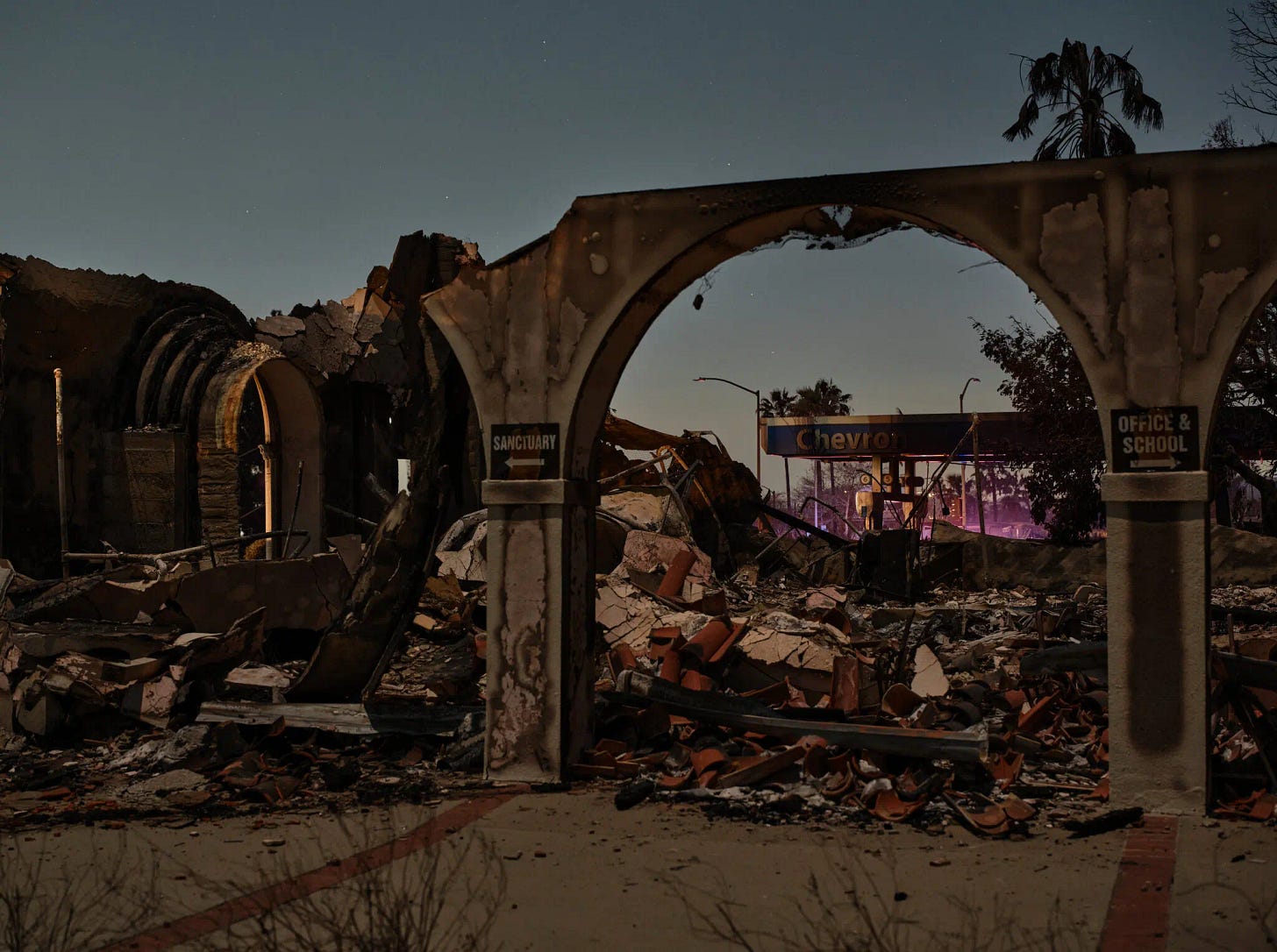“Catastrophic fire erases what was there before. So does forgetting. Memory is a resource for facing the future. Forgetting creates terrible vulnerabilities.”
Rebecca Solnit wrote those words in her seminal book, A Paradise Built in Hell: The Extraordinary Communities That Arise in Disaster. Host of the On the Media podcast, Brooke Gladstone, read them back to her a bit over a week ago, when talking about what she ‘has found shocking but not surprising about the Los Angeles fires.’ The segment was titled, The Role of Memory and Forgetting with the L.A. Wildfires (about 35.30 minutes in).
Their conversation reached my ears when I was on a bus with the family out to the ruins of the extraordinary ancient Mayan city of Yaxha, in northern Guatemala (which, by the way, you can only reach by boat now - the old road is under water).

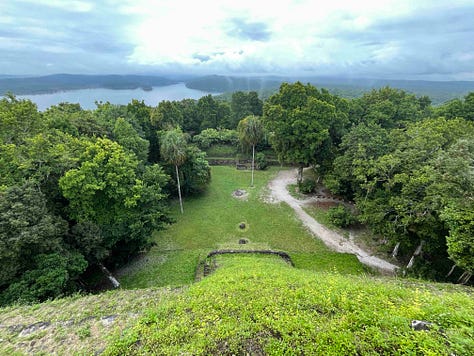

This was just a couple of days after we’d visited the even bigger city of Tikal (or Yax Mutal, as its residents apparently called it). Perhaps inevitably, visiting these huge and complex cities that had their time, I was reflecting on the story of a modern city in the thralls of existential challenge. All the more because these were the days in which I was preparing to launch this Substack, and contemplating the value of it.
LA was burning in a shocking but sadly ‘precedented’ way, Rebecca said, as we’re increasingly experiencing the consequences of worsening biospheric and atmospheric conditions. To be calling it unprecedented, for example, as announcers often were, is to tell a story that falls short of reality, and insodoing hampers our efforts to respond.
“Every crisis is in part a story-telling crisis. That we’re hemmed in by stories that prevent us from seeing, or believing in, or acting on possibilities for change.”
The stories and systems we live by. They’ve been the focus of The RegenNarration podcast for years. But something about hearing them now landed more viscerally, as I ventured to combine the podcast with writing here, and as we wandered the streets of the ultimately ill-fated pre-Columbian Maya civilisation.
True to form, there are outstanding stories emerging from LA of how people are responding to disaster. Rebecca and the On the Media crew featured some on their podcast (from about 44 minutes in). There were media clips featured there too - some are paying attention to these stories (part of a broader shift?).
Another favourite Californian writer of mine, Michaela Haas, wrote a piece for Reasons To Be Cheerful, the outlet founded by David Byrne, titled The Love in the Air Is Thicker Than the Smoke. The by-line read, ‘On the streets of L.A., Michelin-starred chefs are cooking for firefighters, boutiques are giving away clothes and a sprawling city is coming together.’
It opened like this:
Within 48 hours of her high school burning down and her family’s evacuation from Pasadena, 14-year-old Avery Colvert began building an impromptu “shopping center.”
In a large white warehouse, she started stocking clothes for the teenage survivors of the Eaton Fire that scorched her neighborhood. Colvert and her stepdad, Matt Chait, quickly created an online platform, Altadena Girls, to solicit clothing donations. Soon, dozens of people were showing up with bags of shirts and shoes. Fueled by posts from Paris Hilton and Charli XCX, her warehouse is now a bustling community center where displaced teenage fire victims replace the clothes they’ve lost, free of charge.
Michaela went on to say:
To a tourist, Los Angeles might look like a giant metropolis sprawling with interchangeable concrete spaces. But L.A. neighborhoods are communities. We know each other. We greet our neighbors. We watch each other’s pooches. And since the first fires began to ignite last Tuesday, the vital importance of those informal, community networks has become increasingly clear.
That took me back to what Rebecca Solnit said in response to Brooke Gladstone’s invoking of her famous book:
“And that’s what A Paradise Built in Hell is about. The disaster is hell, but the paradise is these communities that people create in response to them. And the question I was left with at the end of the book is, what kinds of discipline, what kinds of memory, what kinds of story-telling, let us build more of that, value more of that?”
That’s the question I’m left with too.
The estimated damage bill from the LA fires is in excess of $250 billion (that’s with a b!). And we’re hearing plenty about the continued evacuation of these areas by the insurance industry.
There was this piece in the New York Times last week by California’s former insurance commissioner from 2011 through 2018, and current director of the Climate Risk Initiative at the University of California, Berkeley, titled ‘This Is Who Should Foot the Bill for the Los Angeles Fires’. It carried this poignant lead photo (by Philip Cheung).
Listeners to the podcast might recall an episode I released from California back in June last year - Bringing the Beaver Back in an Uninsurable State. As Rebecca said, this is a long-emerging pattern. My guest in that podcast, Brock Dolman, told me a story that I’ve told many others since.
So I was joking with you yesterday [that of] the many books I would wish to write, one of them I would title Uninsurable Planet. And it really is this moment, I think, in many parts of the planet, but [certainly] here in California, of the idea that the whole insurance thing, which I was referring to yesterday as a bit of a casino, a bit of a racket, [with] the idea that the house always wins. The casinos were gamblers at the table, they thought they had the table, they thought they had the house, and so they put all in and they basically lost that bet. And they're leaving the state in droves….
So how do we strategically, intentionally [build] community as our own insurance policy? This was really brought forward by one of the executive directors of a large [conservative Christian] camp in our watershed … who basically, in one of these meetings of landowners, 50 or 60 of us, said ‘you know what? We got dropped, we have no more insurance, we can't get insurance. This process, you all, us in the room, we're our insurance. Together we insure ourselves by working together … to restore the condition of our properties…’. It took an emergency…
Funnily enough, Smokey the Bear came up in the On the Media conversation with Rebecca Solnit, as she talked of its origins in the European-derived cultural aversion to fire (as distinct from First Nations’ traditional fire management). And Brock had this to say about some telling research by Emily Fairfax and co. on previous fires:
And they went back [to] the satellite imagery, before the burn, and found places that had beaver pre-burn. Then [they] looked at those same sites post-burn … and they found these incredible green oases of beaver habitats and beaver wetlands that didn't burn during the fire. It's black everywhere else around it…. In fact in Southern California they had a moment where … a black bear took refuge in beaver habitat. So Smokey the Beaver helped save Smokey the Bear.
Around the time of our recording, the California State Assembly had unanimously passed what's been dubbed The Beaver Bill, on the back of Brock and his community building a campaign over 25 years. These are the new - and old - stories, with people coming together, across divides, building new paradises.
So what if we do take more of the spirit of these stories ‘built in hell’, beyond our emergencies, as Rebecca wondered, into re-making not just our cities and towns, but the stories and systems that shape them?
What if we redirect more of our dollars there too, saving ourselves some of the increasing ‘repair’ bills, into the hundreds of billions in LA, trillions globally, that still don’t touch the surface of the real cost. ‘Every time a piece of our beloved city burns’, Michaela Haas wrote, ‘it takes an emotional and mental toll that cannot be quantified in trauma yards and grief dollars.’
And what if we do develop the disciplines, in our private and public lives, to remember, to look soberly, to live with more of the joy - yes, joy - and inspiration prompted by crisis, in our daily lives?
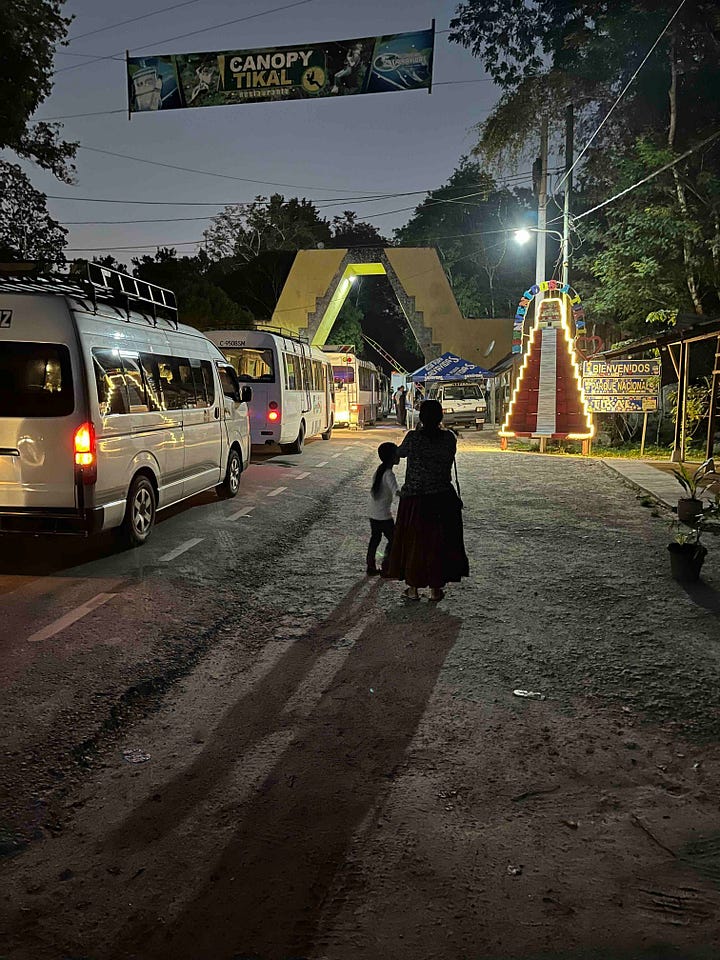
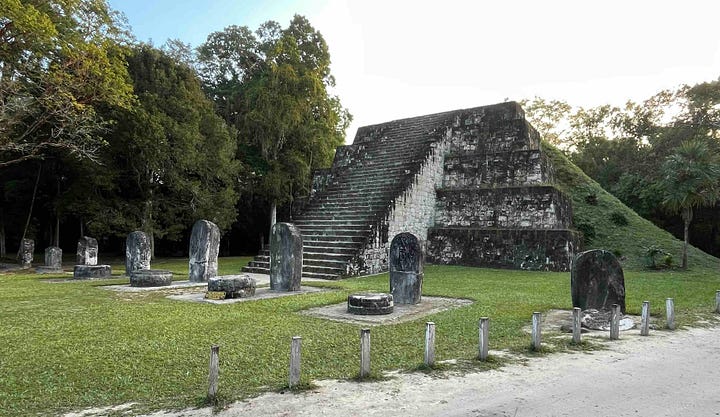
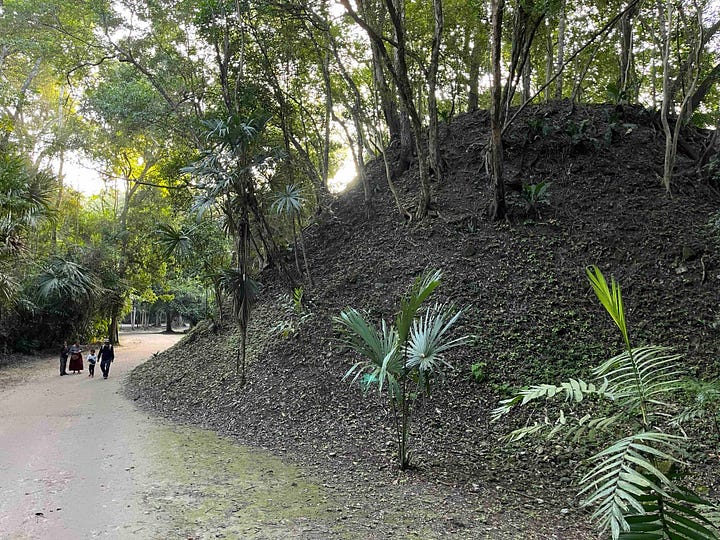

Past the glitzy gate, our pre-dawn arrival at Tikal was greeted by misty and mysterious silence. By the time we circled back to the Grand Plaza around noon, it was full of people. Tourists, to be sure. And Mayan descendents of the original inhabitants, too, including our friends (pictured above).
I’ll admit to thinking ‘get me outta here’ for a moment. But then it occurred to me, the city was alive. Transformed, yes. But all these centuries on, alive. Full of human and other wildlife. Food. Ceremony. Stories.
Things could go any number of ways for us from here. What other stories will we shape our cities and towns with now?
Thanks so much to you early subscribers for joining me here. Especially to you first paid subscribers - Olivia Cheng (my steadfast wife!), alongside dear souls Andrew Stone, Katie Ross, Frances Pollock, Emma Sodamaco and Laura Dalrymple.





